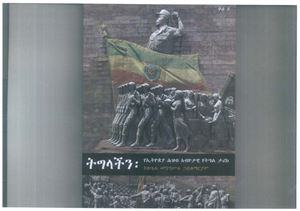TSEHAI Publishers, Los Angeles, 2004. — 505 p. (in Amharic)
Colonel M. Haile Mariam - the former Ethiopian president. The book
covers the period between 1960 and 1970, the time leading to the
Ethiopian revolution and the final defeat of the Somalia Army by
the Ethiopian Army.
The book begins by giving a philosophical defence on the importance of writing the history of the great Ethiopian revolution. The defence enumerates some of the social and cultural achievements of the revolution, namely, the all-out war to eradicate illiteracy and backwardness; the coming into existence of the first publishing agency, Kuraz; the sprouting of Ethiopian literature during the time; and the translation into Amharic of some of the outstanding works of socialist (communist) thinkers.
The book is a work of careful contemplation, rich of names, places, and occasions. The language of the narration, though by no means noble, is flawless and adequate. Except occasionally, when it is absolutely necessary to provide details and facts, the book flows fast and reads well. Perhaps this is because the Mengistu we meet in those pages is no longer the 37 years old Mengistu of the revolution, but the 75 years old statesman who looks into the past with patience and amazing clarity. Therefore, throughout the book, Mengistu is presented to us as reconciliatory, wise, peace loving, intelligentsia friendly, and premeditative; who always prefers to deal with conflicts through dialogue and impromptu discussions over the phone or over dinner. We never see him wilfully confronting, demeaning, or embarrassing his opponents, in public or private; he will be the last to pronounce judgement on the unfortunates when this must no longer be avoided.
The book begins by giving a philosophical defence on the importance of writing the history of the great Ethiopian revolution. The defence enumerates some of the social and cultural achievements of the revolution, namely, the all-out war to eradicate illiteracy and backwardness; the coming into existence of the first publishing agency, Kuraz; the sprouting of Ethiopian literature during the time; and the translation into Amharic of some of the outstanding works of socialist (communist) thinkers.
The book is a work of careful contemplation, rich of names, places, and occasions. The language of the narration, though by no means noble, is flawless and adequate. Except occasionally, when it is absolutely necessary to provide details and facts, the book flows fast and reads well. Perhaps this is because the Mengistu we meet in those pages is no longer the 37 years old Mengistu of the revolution, but the 75 years old statesman who looks into the past with patience and amazing clarity. Therefore, throughout the book, Mengistu is presented to us as reconciliatory, wise, peace loving, intelligentsia friendly, and premeditative; who always prefers to deal with conflicts through dialogue and impromptu discussions over the phone or over dinner. We never see him wilfully confronting, demeaning, or embarrassing his opponents, in public or private; he will be the last to pronounce judgement on the unfortunates when this must no longer be avoided.

